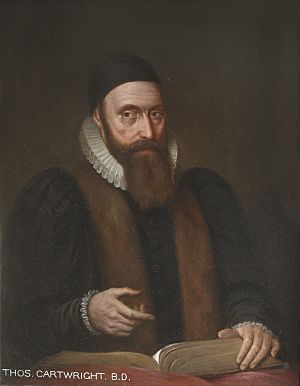Thomas Cartwright (theologian) facts for kids
Quick facts for kids
Thomas Cartwright
|
|
|---|---|

Portrait by Gustavus Ellinthorpe Sintzenich,
at Mansfield College, Oxford |
|
| Born | c. 1535 |
| Died | 27 December 1603 |
| Nationality | English |
| Occupation | Vice-chancellor of Trinity College, Cambridge |
Thomas Cartwright (born around 1535, died 1603) was an important English religious leader. He was a Puritan preacher and a theologian, which means he studied religion deeply. Puritans were a group of Protestants who wanted to make the Church of England simpler. They believed the church should be more like the early Christian church.
Contents
Thomas Cartwright's Early Life and Studies
Thomas Cartwright was likely born in Royston, a town in Hertfordshire, England. He went to St John's College, Cambridge to study religion.
When Queen Mary I of England became queen in 1553, she was Catholic. She made many changes that forced Protestants like Cartwright to leave the university. He then worked as a clerk for a lawyer.
Five years later, Queen Elizabeth I became queen. She was Protestant, so Cartwright could go back to his studies. He soon became a fellow (a senior member) at St John's College and later at Trinity College, Cambridge.
His Beliefs and Challenges
In 1564, Cartwright took part in a religious debate. This happened when Queen Elizabeth visited Cambridge. The next year, he started to speak about Puritan ideas. These ideas were about how church services should be done and how the church should be organized.
He was popular in Ireland for a while, working for Adam Loftus, a church leader there. In 1569, Cartwright became a professor of divinity at Cambridge. This was a very important teaching job.
Standing Up for His Ideas
In 1570, Cartwright openly called for a new way to run the Church of England. This new way was called Presbyterianism. It meant that the church should be led by elected elders, not by bishops appointed by the queen.
John Whitgift, who was in charge of the university, did not agree with Cartwright. Whitgift removed him from his teaching job in December 1570. He also took away Cartwright's fellowship at Trinity College in 1571.
Cartwright had used his teaching position to criticize the Church of England. He believed it was not organized like the early Christian church. The disagreement between Cartwright and Whitgift became so big that William Cecil, a powerful government official, had to step in.
After losing his jobs, Cartwright visited Theodore Beza in Geneva, Switzerland. Beza was a famous Protestant reformer. Cartwright came back to England in 1572. He might have become a professor of Hebrew, but he supported a paper called "Admonition to the Parliament." This paper criticized the church again.
To avoid being arrested, he left England once more. He worked as a clergyman for English people living in Antwerp and Middelburg in the Netherlands.
Later Years and Legacy
In 1576, Cartwright visited the Channel Islands. He helped organize the Huguenot churches there. Huguenots were French Protestants. He also helped to improve a version of the New Testament Bible.
He then settled back in Antwerp as a pastor. He even turned down a teaching job at a university in Scotland.
In 1585, he returned to London without official permission. He was put in prison for a short time. Later that year, he became the head of a hospital in Warwick. This hospital was supported by a powerful nobleman, the Earl of Leicester.
In 1590, he was called before a special court and imprisoned again. In 1591, he was sent to the Fleet prison. However, he was not treated badly, and powerful friends helped him get released quickly.
He visited Guernsey again between 1595 and 1598. He spent his last years living comfortably in Warwick. He died there on December 27, 1603.
His Character and Influence
Thomas Cartwright was known as a smart and original thinker. He was also said to be very passionate. He strongly believed in Presbyterianism. He did not agree with groups like the Brownists or Independents, who wanted churches to be completely separate from the government.
Cartwright believed that the church and the government should work together. He thought that everyone should follow the rules of the reformed national Presbyterian church. Many people believe that he helped shape Puritanism in England. He gave it a clear system and made it a stronger movement.

